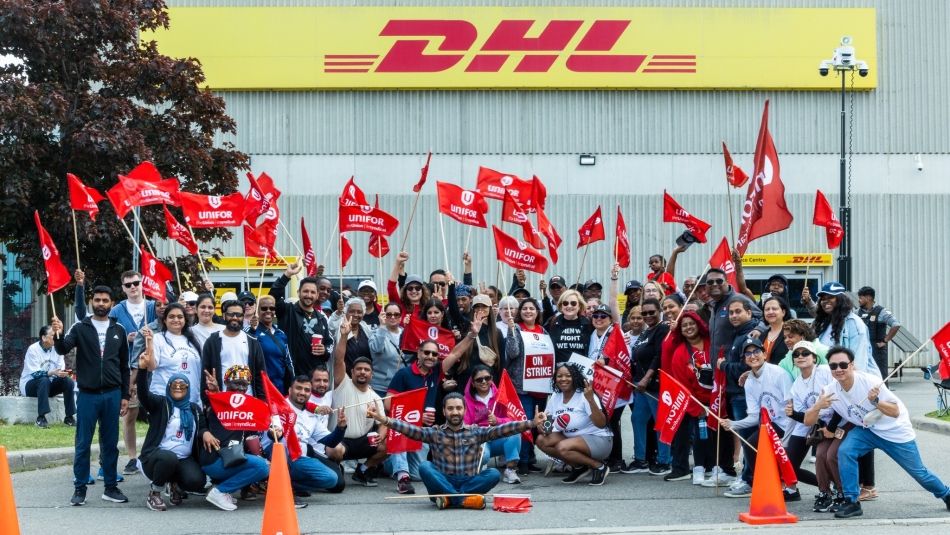
Share
TORONTO—Unifor has responded to a brazen attempt by DHL Express Canada to circumvent new federal labour laws. The company sent a letter to the federal government requesting a special exception from the ramifications of Bill C-58, the anti-scab legislation that comes into effect on Friday.
“Let’s be clear—DHL is not the victim here. This company locked out its own workers, forcing members to respond with strike action, and now they want the government to override the collective bargaining rights of workers,” said Unifor National President Lana Payne.
“They chose confrontation. Now, instead of negotiating a fair agreement at the table, DHL is running to Ottawa to ask for special treatment to get around a law designed to protect workers and safeguard the integrity of collective bargaining. Unifor will stand firm, and we expect the federal government to do the same. No exemptions. No bending the rules.”
Unifor members at DHL Express Canada were locked out by their employer on June 8, after the workers refused to accept concessions put forth by the company. Members were forced to respond with strike action.
Anti-scab legislation takes effect June 20, 2025, following years of advocacy by Unifor and the labour movement. It levels the playing field and prevents employers from dragging out disputes by using replacement workers. DHL, it seems, neither wants to negotiate fairly, nor face the consequences of a lockout.
DHL has aligned itself with the 'Moving Economies' coalition—a group of employers actively working to roll back workers’ bargaining rights and weaken federal protections. This latest request for exception to allow DHL to keep using scabs and/or excessive government intervention in the bargaining process is part of that broader effort to undermine the tools that workers rely on for fair and meaningful negotiations.
Throughout bargaining, DHL has demanded significant concessions that would severely hurt workers. These include:
• Changing the driver pay system in a way that would result in less money for drivers.
• Forcing drivers to travel up to 100 km just to reach their routes or pick up freight—with no compensation.
• Proposing language that would allow the company to refuse WSIB and general workplace accommodation requests.
• Refusing to acknowledge and provide wage adjustments to customer service and other classifications – some of which are just barely ahead of minimum wage.
• Seeking the ability to lay off employees more easily.
• No recognition for job loss that may occur through the use of AI.
• Attempting to reduce the daily minimum guarantee for drivers.
• Rerouting pickups across the country while cutting pay for owner-operators.
The German-based parcel delivery giant’s annual profit is roughly $3.3 billion Euro ($4.6 billion CDN) and revenue from its significant and growing North American enterprise is worth approximately $6 billion Euro ($9.4 billion CDN).
“DHL’s decision to lock us out has already disrupted operations—and they want the government and the public to believe that workers are at fault,” said Quebec Director Daniel Cloutier.
“The power to resume full service and support customers is entirely in DHL’s hands. This is a crisis of their making. The only place this dispute will be resolved is at the bargaining table.”
Unifor represents over 2,100 DHL Express Canada workers who as truck drivers, couriers, warehouse and clerical workers across Canada, at Locals 114 in British Columbia, 700 in Quebec, 755 in Manitoba and Saskatchewan, 4005 in Nova Scotia, 4457 in Ontario and members in DHL Alberta.
Read Unifor’s response to DHL’s application here.
Unifor is Canada’s largest union in the private sector, representing 320,000 workers in every major area of the economy. The union advocates for all working people and their rights, fights for equality and social justice in Canada and abroad, and strives to create progressive change for a better future.
For media inquiries, please contact Unifor Communications Representative Jenny Yuen at @email or 416-938-6157 (cell).
For media inquiries in French, contact: Unifor Quebec Communications Representative Véronique Figliuzzi at @email.


